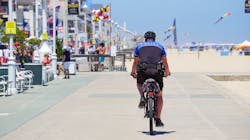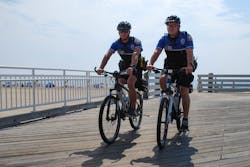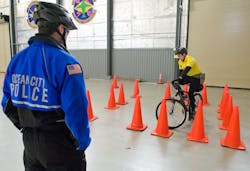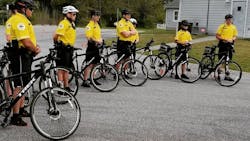In the mid-Atlantic region, beachside towns in states like Maryland, Delaware, Virginia and New Jersey have shaken off the frost and are in full gear for the summer. Vacationers are coming back after the COVID-19 pandemic kept them away two years ago and shops and restaurants that depend on their business are once again fully open. For police departments in these towns, summertime means staffing bike patrol units to keep a watchful eye over boardwalks and other areas not easily accessible by patrol vehicles.
Sgt. Patrick Foley, who oversees the bike patrol program for the Bethany Beach Police Department in Delaware and Officer Corwin Vincent, who is a member of the bike patrol unit with the Ocean City Police Department in Maryland, recently spoke to OFFICER Magazine about how patrolling beach towns differs from other areas.Off-season vs. in-season
During the offseason, the population of Ocean City consists of approximately 5,000 full-time residents. In the summertime, and more specifically holiday weekends such as Memorial Day Weekend or the Fourth of July, the population can jump to as many as 500,000 people, according to Vincent.
Approximately 70 Ocean City police officers are certified by the International Police Mountain Bike Association (IPMBA). During the summer season, approximately 40 of those certified officers operate in a uniformed bicycle patrol capacity. The bike patrol in the off-season is primarily detailed to special events that draw large crowds, such as car shows, parades and city-sponsored events.
The town of Bethany Beach is one square mile and the boardwalk stretches roughly between 10 city blocks. While it’s not as busy and commercialized as neighboring beach towns like Ocean City, which is about 15 miles down the coast, it still grows substantially in the summer months. There are only about 1,600 year-round residents, but in the summer season, which spans May 15 to Oct. 1, that number increases to close to 25,000. This includes rentals, beach homes and visitors of the beach, according to Foley, who has served with the department full-time for 17 years and for four summers as a seasonal police officer before that. “It’s two drastically different police departments in June than it is in January,” he says.
There are 10 full-time year-round officers on the Bethany Beach Police Department. Eight of those officers work the road and two are administrative. The department is approved for 16 part-time seasonal officers.
In the offseason, the Bethany Beach Police Department also deploys the bike patrol during special events. “If there’s localized events—we have 5k runs, boardwalk events, arts and craft shows, in the winter time we have some ice sculpture events that just keep the tourism going—we utilize the bike patrol for those just to have a police presence just so you’re not merely sitting in a police car and nobody can approach you. We like to be out and integrated with the community.”Bouncing back from COVID
According to Vincent, at the height of the pandemic, hotel rates in Ocean City were reduced while people were receiving COVID relief funds. “As a result, Ocean City did not experience much of a decline in visitors, as people still flocked to the resort town as relief from COVID restrictions in their home states,” he says.
Last summer, the beach town returned to ‘normal’ to a certain degree. “Ocean City was busy during the summer. In 2020, we experienced a rise in violent crime as compared to years past. Then in the summer of 2021, we started to see crime statistics returning to pre-COVID numbers,” says Vincent. “Ocean City is adding multiple special events to the summer of 2022 schedule and the number of visitors is expected to rise as a result.”
While the COVID-19 pandemic limited the number of visitors to Bethany Beach, Foley says that the bike patrol stayed busy. “When COVID was in the thick of it, our bike patrol actually became more increasingly present. More officers were assigned to bike patrol, believe it or not, during the COVID months in 2020 than in 2021, just simply because there was mandatory mask enforcement on the beach as well as the boardwalk and the main commercial areas of Bethany Beach.”
He says that the bike patrol had a high visibility of presence, telling people to adhere to the governor’s restrictions and enforcing the mask mandate. “In 2021, I don’t want to say things went back to normal, I think it was more of an influx in people, just because a lot of people stayed away, they wanted to keep to themselves to remain healthy during COVID and then in 2021, when the government restrictions were eased, a lot of people started coming out and resuming normal activities as they would with renting, visiting the beach and going out to dinner.”
He says that so far, it’s been full steam ahead this summer with weekly rentals reported by the local real estate offices already surpassing last year’s numbers.Responding on bike
The Ocean City Police Department’s bike patrol mainly responds to calls for service for local ordinance violations and peace and good order enforcement, according to Vincent. “Patrolling on a bicycle complements this directive by allowing officers to quickly move throughout the town without having to experience busy summer traffic, which can often be grid-locked, decreasing the response time of officers in vehicles,” he says. “The Ocean City Police Department is known for its bicycle patrol because officers can efficiently and safely travel between calls for service.”
Overall, he says that Ocean City is a great environment for bike patrol. “There is an array of different areas to be patrolled and all are suited for bicycle patrol,” he says. “Patrolling the busy boardwalk—especially at night—is considerably difficult due to public transportation and a large number of people. Patrolling alleys, main roads and neighborhoods is a welcome break from the boardwalk and can invite a different style of policing.”
The Bethany Beach bike patrol for the most part answers normal calls for service, but they do so in a heavily populated, high-density traffic volume area that’s more accessible to get to on bike faster than it is in a patrol vehicle. Calls for service include property crimes, criminal mischief, burglary, theft from motor vehicles, a lot of retail thefts and shopliftings, disorderly public intoxications and juvenile issues out on the beach, whether it’s curfews or alcohol violations. “We pretty much vary all across the board,” says Foley.
Patrol concerns on bike
Foley states that vehicular cycling—riding bicycles on roads in a manner that is in accordance with the principles for driving in traffic—is one of the biggest concerns for bike patrol officers. “When completing the bicycle training through IPMBA, the number one thing is you want to go home at the end of your shift, and you don’t want it to be based on a reckless driver or someone that is trying to get into a parking spot that is open,” he says. “You have to be aware of your surroundings. Being out in the public this day in age in policing is obviously scary, but when you involve motor vehicles and distracted drivers and people who are trying to get from point A to point B rather quickly, it puts you at a higher risk of safety for being involved in a collision when you are out on a bike, rather than simply patrolling a development in a car.”
He says that there are more roadway hazards near the beach with sand, boardwalks with nails and sewer grates than there is in developments. “It’s actually safer patrolling a development just because it has a designated bike lanes and more space for you to use rather than the boardwalk, where you have pedestrians in very close proximity and people up on the boardwalk. It’s just a higher risk of caution to be in those highly populated pedestrian areas.”
Vincent says that one of the main points that is stressed to the bike patrol during IPMBA training is the importance of the care and maintenance of the bicycle. “Beachside elements are brutal on bicycles and require constant maintenance,” says Vincent. “Sand and salt water can cause damage to bicycles and equipment. Our boardwalk is notorious for being very slippery during periods of rain. Safety is a point of emphasis and officers are reminded to utilize other avenues of travel to avoid the slippery conditions.”
Another concern is the physical well-being of the officers. “For bike patrol, you need to be physically fit to endure rigorous cycling activities on a 12-hour shift,” says Foley. “Day work or night work you’re in 93-degree heat with 100% humidity. It’s pretty treacherous on your body. Being physically fit is obviously the most important.”
Bethany Beach’s policies and procedures require officers to stay in good shape to be on bike patrol, making them less prone to injuries. The weather is also a concern. “We always make sure that officers are fully equipped with ice cold water before they go out on their patrol,” says Foley. “Our police patrol bikes have two water cages for that very reason. We have a very good rapport with local businesses along the main commercial district as well as the boardwalk that we can just pop right in and maybe stand in the doorway and get some air conditioning. It’s not Florida heat, but the late days of July and August, it’s just brutally humid and there’s no breeze, and you’re just baking in the sun.”
Connecting with the public
The approachability of bike patrol officers also has a lot to do with their appearance. They are often wearing bright-colored shirts and lack a lot of the extra gear usually strapped to the usual patrol officers. Foley says that while law enforcement is moving towards more tactical-looking uniforms, that doesn’t translate well to the work of bicycle patrols. “We simply wear wicking material shirts and polos with high visibility,” he says. “We don’t want to be involved in an altercation where someone can grab ahold of one of our (officers) who is riding a bicycle on the boardwalk just because they are in close proximity of other people.”
With the visibility of bike patrol officers, there are more opportunities to connect with the public. “You have more public contacts on a 12-hour shift on bike than you could possibly have in four days in a police car,” says Foley. “The businesses love it, just because it’s a high visibility that we have in the commercial district and the boardwalk district where we can be flagged down in the event of an ongoing crime that’s in progress or shoplifting. We’re readily available and highly recognizable by most business owners and eateries up on the boardwalk.”
About the Author
Paul Peluso
Editor
Paul Peluso is the Managing Editor of OFFICER Magazine and has been with the Officer Media Group since 2006. He began as an Associate Editor, writing and editing content for Officer.com. Previously, Paul worked as a reporter for several newspapers in the suburbs of Baltimore, MD.




